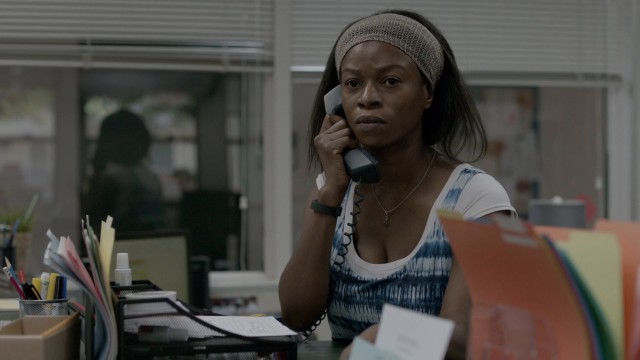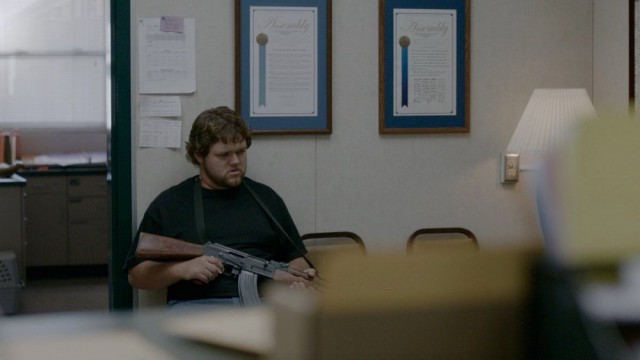The opening shot of DeKalb Elementary is a decoder ring to its director’s intentions for the rest of the film. A static shot peering into a school office from just outside the doorway, we see people arrive and depart, adhering to the normal rhythms of the workplace, until we are left with a single office worker at the center of the frame. A man walks in, his back to the camera, and, in a small voice, asks to use the phone. He then calmly pulls an AR-15 rifle out of his bag and gravely announces, “this is real.”
Such a situation is certainly far too real in America, which experienced another high-profile massacre at a school in Uvalde, Texas a few weeks ago. Reed Van Dyk’s film, which came to prominence on the 2017 festival circuit before going on to be nominated for Oscar, seeks to harness the intensity of feeling over this collective trauma and bend it into a tension-filled two-hander that grapples with anger and fear, but also with the possibility of connection and grace.
As the introductory shot of the film establishes, DeKalb Elementary limits its perspective to a single setting and then uses subtle, unobtrusive direction to situate the viewer as a ghost within the space. With an ear toward naturalism, the key performances (by Tarra Riggs and Bo Mitchell) studiously avoid pathos or melodrama, and much of the suspense is wrung from what is not seen rather than what is on screen. Artists respond to the culture, and with the depressing recurrence of these events in American life, it is of little surprise that “school shooting” as a premise has been a burgeoning short film subgenre in recent years—we have screened well over a dozen examples here at Short of the Week—but Van Dyk has crafted the most prominent and celebrated entry in this growing category by maximizing the sensation of presence and authenticity. To what end though?

Tarra Riggs as school worker Cassandra Rice
Films that dramatize fraught incidents of real-world violence must confront criticisms of exploitation. Often the rebuttal to co-opting such charged subject matter is that the films “raise awareness”—the filmmaker thus doing their small part to increase the salience of the issue in the larger culture. The other response is that they humanize subjects who may be reduced to mere statistics by a dry adherence to the “who, what, and why” of journalistic practice. As Roger Ebert famously described, “movies are like a machine that generates empathy”, so by situating viewers in the midst of a horrific situation, the magic of audio-visual storytelling can crack their protective shell and force them to truly reckon with the subject in a way they might otherwise avoid.
Neither option feels like it really applies to school shootings, however. My adult life bookends this current era of school shootings in America. I was a high school student during Columbine in 1999 when 12 students died, and now I’m an elementary school parent at the same time that 19 elementary students perished at Uvalde. While it is true that people, in general, are predisposed to treating tragedy that does not affect them personally with a degree of emotional remove, school shootings do not lack for an intensity of public feeling nor are they under-discussed in the culture. In the aftermath of each event I, like millions of others, vividly imagined myself or my child in a similar situation, provoking myself to tears without the need of a filmmaker to manipulate my already overwhelming feelings.
This is where many short films get tripped up, as a premise is insufficient. Van Dyk has made the most successful film of this ilk by treating the “school shooting” premise almost incidentally—he avoids the easy imagery of fearful children and panicked teachers, of impending dread and bloody carnage. Instead, DeKalb Elementary is a portrait of grace under fire, of an unexpected call to heroism, accomplished not through physical bravery, but emotional courage. Trapped in a room with a shooter, an office worker uses her humanity to talk down the young man and to liaise with the police outside, avoiding tragedy. Despite his homicidal intentions, the shooter is likewise represented with dignity and sympathy, as the conversation between the two characters broaches issues of hopelessness, anger, and mental health.

Bo Mitchell as school shooter Steven Hall
Gripping as it is, Dekalb Elementary’s belief in the healing power of interpersonal connection could be accused of naive wish-fulfillment if it wasn’t based on a true story from 2013. Working on the early stages of a script centered around a school shooting, Van Dyk was researching the subject when he encountered news reports of the incident which contained the emergency 911 call. Audible was the entirety of Antoinette Tuff’s conversation with the prospective shooter, Michael Brandon Hill, as she successfully defused the situation. Van Dyk was indescribably moved by what he heard. In an interview with Vimeo Staff Picks, which premiered the online release of the film last week, Van Dyk described that, “For weeks I couldn’t get their voices out of my head. Her strength and compassion, his confusion and regret. It touched me in a deep place, and so I began to wonder if I could bring their encounter to life on film.”
Van Dyk used that recording as his guidepost, returning to it over and over again when rehearsing with Riggs and Mitchell on their performances, and allowing it to inform his visual approach for the film. As I noted earlier, much of the film is defined by what is left off-screen (we do not see any of the children in the school for example, though we can hear them) and Van Dyk attributes this strategy to his reverence for the recording, noting in No Film School that this “idea was born out of the fact that my experience with the story was, from the very beginning, auditory. All I had were the voices of these people on a 911 recording, and it left so many questions that I found to be interesting, as a listener. I thought it’d be worth trying to approach the visual side of the movie in the same way, to essentially leave certain things offscreen and remain almost entirely in the office.”
While borrowing so many cues and even lines of dialogue from real life perhaps lessens one’s appreciation for DeKalb Elementary as a film, I would argue that it must still be commended as a grand achievement of adaptation. Neither the performances nor the visual approach should be taken for granted. In a fun comparison, you can compare Van Dyk’s work from 2017 against Faith Under Fire a made-for-TV movie based on Tuff’s memoir that premiered on the Lifetime channel in 2018. The trailer showcases the vastly different tacks one can take to the same story!
After being tied up in distribution the past several years, DeKalb Elementary is now online as a Vimeo Staff Pick Premiere, complete with a Director’s Commentary audio version. If the timing of the release feels cynical, so close in time to the events in Texas, that is, unfortunately, an America problem. Van Dyk received a lot of flak during the film’s 2018 Oscar campaign, as observers accused the film of benefitting from tragedy then—that year it was the Marjory Stoneman Douglas High School shooting in Parkland, Florida. On the heels of the film’s success, Van Dyk finished another short film, 2019’s Interiør, which played TIFF and Clermont Ferrand and is an interesting companion piece to DeKalb, playing with a related subject matter. After a quiet couple of years, we have learned that Van Dyk is now far along on two feature film projects, one based on an original script, and another which is an adaptation of a New Yorker story.

 Jason Sondhi
Jason Sondhi